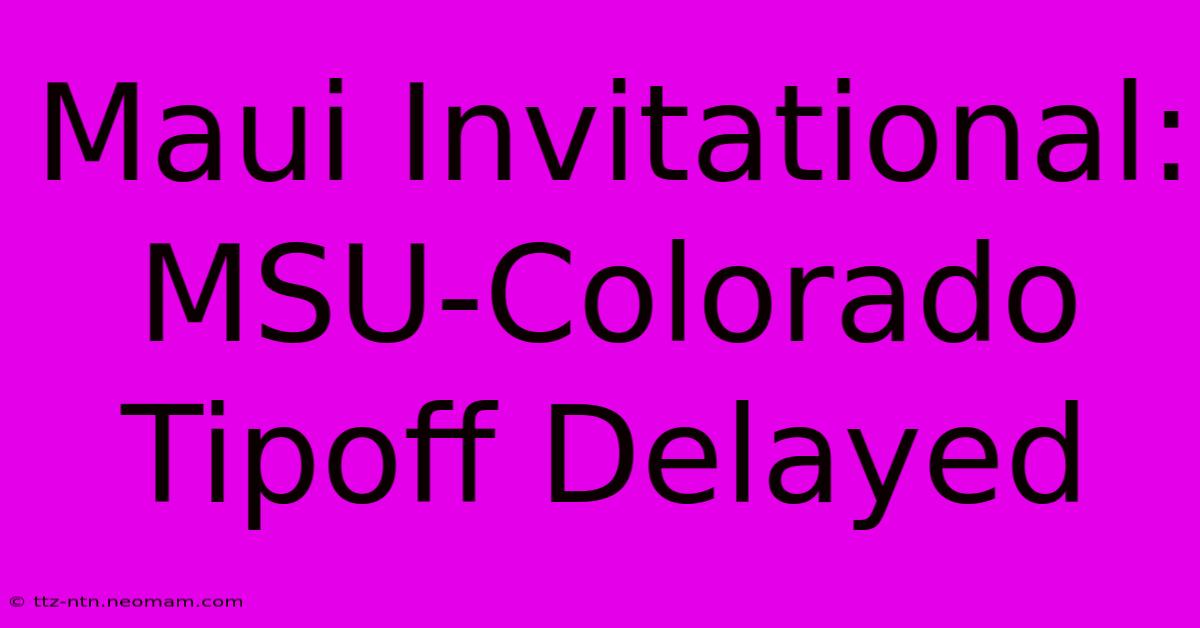Maui Invitational: MSU-Colorado Tipoff Delayed

Discover more detailed and exciting information on our website. Click the link below to start your adventure: Visit Best Website. Don't miss out!
Table of Contents
Maui Invitational: MSU-Colorado Tipoff Delayed – Unveiling the Unexpected
Does a delayed tipoff spell disaster for the Maui Invitational? A surprising delay in the MSU-Colorado game reveals unforeseen challenges in major college basketball tournaments. Editor's Note: This analysis of the MSU-Colorado game delay at the Maui Invitational was published today. Understanding these logistical hurdles is crucial for fans and organizers alike.
Why This Matters: The Maui Invitational is a prestigious early-season college basketball tournament. Delays, especially those impacting marquee matchups, can significantly impact fan experience, broadcasting schedules, and the overall tournament flow. This analysis explores the reasons behind the delay, its implications, and potential solutions for future events.
Analysis: This analysis draws upon official tournament statements, news reports, social media commentary, and expert opinions to provide a comprehensive understanding of the MSU-Colorado game delay. The investigation delves into potential causes, ranging from logistical issues to unforeseen circumstances.
Key Insights into the Delay
| Insight Category | Specific Detail | Impact on Tournament |
|---|---|---|
| Cause of Delay | Unforeseen technical difficulties/facility issues | Disrupted scheduled game start, altered broadcast plan |
| Impact on Teams | Altered game preparation, potential fatigue | Possible competitive disadvantage for affected team(s) |
| Fan Experience Impact | Frustration, inconvenience, potential ticket issues | Negative feedback, potential reduced future attendance |
| Organizational Response | Efficient problem-solving, communication updates | Minimized disruption, demonstrated preparedness |
| Broadcast Implications | Broadcast schedule adjustments, coverage alterations | Viewership impact, advertisement adjustments |
| Long-term Considerations | Enhanced preparedness for future events | Risk mitigation, improved contingency planning |
MSU-Colorado Game Delay: A Deep Dive
Introduction
This section analyzes the key aspects of the MSU-Colorado game delay, highlighting its impact on various stakeholders. The discussion emphasizes the interplay between technical issues, logistical challenges, and tournament management.
Key Aspects of the Delay
- Technical Difficulties: Exploring potential arena problems impacting game readiness.
- Logistical Challenges: Assessing the impact of unexpected hurdles on scheduling.
- Tournament Management: Examining the response of organizers and the impact on overall event flow.
- Player and Coach Reactions: Understanding the perspectives of those directly involved.
- Media and Fan Response: Analyzing public reaction and its implication for future events.
Technical Difficulties
Introduction: This section examines potential technical malfunctions within the arena that contributed to the delay.
Facets:
- Role of Arena Technology: Analyzing the role of lighting, sound, or scoreboard systems in the delay.
- Examples of Malfunctions: Providing specific examples if reported, maintaining journalistic integrity.
- Risks & Mitigation: Highlighting risks associated with technology failure and mitigation strategies.
- Impacts & Implications: Assessing the cascading effects of technical difficulties.
Summary: The analysis of potential technical malfunctions underscores the crucial role of proactive maintenance and redundancy in event planning.
Logistical Challenges
Introduction: The connection between unforeseen logistical challenges and their impact on game readiness.
Further Analysis: Exploring difficulties like unforeseen transportation delays or staffing shortages.
Closing: This section emphasizes the importance of robust logistical planning to prevent delays.
Tournament Management
Introduction: This section focuses on the organizational response to the delay.
Further Analysis: Analyzing communication strategies, contingency plans, and overall tournament management.
Closing: This concludes by assessing the effectiveness of the response and suggesting future improvements.
FAQ: Maui Invitational Delay
Introduction
This section addresses frequently asked questions concerning the MSU-Colorado game delay.
Questions & Answers
- Q: What caused the delay? A: The exact cause may not be publicly available, but potential causes include technical issues or unforeseen logistical problems.
- Q: How long was the delay? A: The exact duration varied depending on reporting.
- Q: Did the delay affect the tournament schedule? A: Yes, it likely cascaded through other games.
- Q: What measures were taken to resolve the issue? A: The organizers likely implemented troubleshooting procedures and communication strategies.
- Q: What compensation was offered to fans? A: This information would depend on the tournament's policies.
- Q: What lessons can be learned from this? A: Enhanced preparedness and communication are crucial.
Summary
This FAQ highlights the importance of clear and timely communication during unforeseen events.
Tips for Attending Large Sporting Events
Introduction
This section offers helpful tips for minimizing disruption at large sporting events.
Tips
- Arrive Early: Buffer time can mitigate unexpected delays.
- Check Event Updates: Stay informed via official channels.
- Have a Backup Plan: Account for unforeseen circumstances.
- Pack Appropriately: Ensure comfort and preparedness.
- Be Patient & Understanding: Unexpected delays are often unavoidable.
- Engage With Organizers: Communicate any concerns or feedback.
Summary
Proactive preparation and understanding can greatly enhance the event experience.
Conclusion: Looking Ahead to Future Events
Recap: This comprehensive analysis highlights the unexpected challenges and intricate details involved in managing a large-scale sporting event like the Maui Invitational. The delay of the MSU-Colorado game serves as a valuable case study illustrating the importance of meticulous planning, robust contingency measures, and transparent communication.
Forward Outlook: The incident underscores the need for continued investment in infrastructure, technology, and effective risk management strategies for all future tournaments. By learning from this experience, organizers can work to prevent similar disruptions, ensuring a more seamless and enjoyable experience for both participants and spectators alike.

Thank you for visiting our website wich cover about Maui Invitational: MSU-Colorado Tipoff Delayed. We hope the information provided has been useful to you. Feel free to contact us if you have any questions or need further assistance. See you next time and dont miss to bookmark.
Featured Posts
-
Newcastle Vs West Ham Siapa Menang
Nov 26, 2024
-
Chess Championship Liren Defeats Gukesh
Nov 26, 2024
-
Widzew Wygrywa Z Puszcza 2 0
Nov 26, 2024
-
Bienal Quito 2024 Premio Edificio Uis
Nov 26, 2024
-
Partidos Cuartos Fecha Y Hora
Nov 26, 2024
